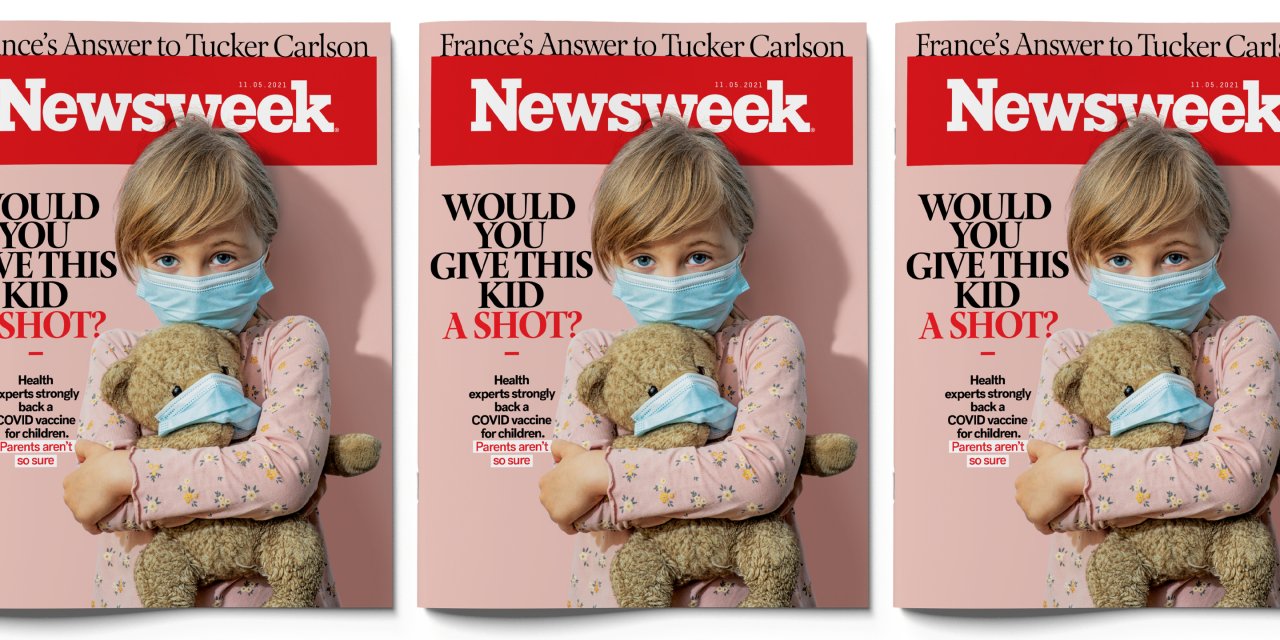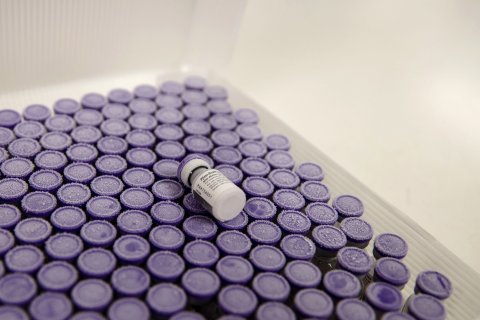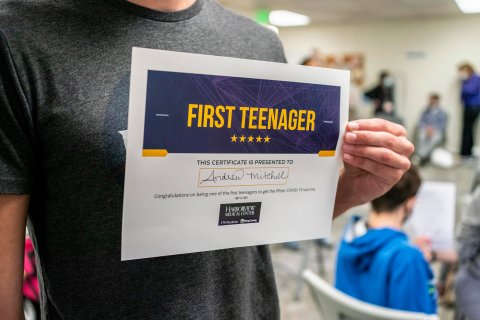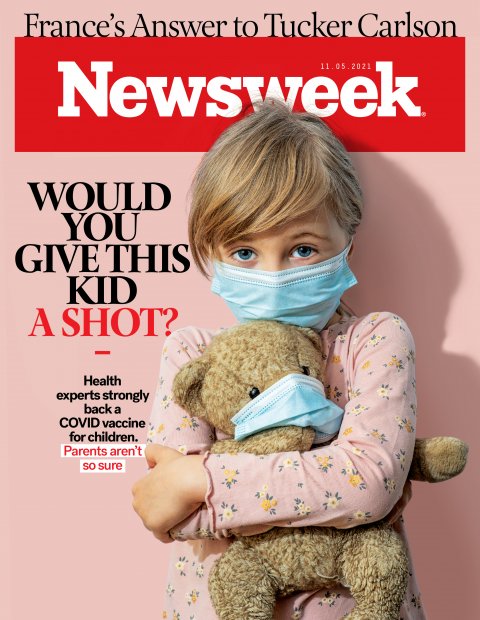
Hong Kong Adds COVID Restrictions to Be 'More in Line' With China
Parents? Not so much. According to a Kaiser Family Foundation poll, four in 10 parents with children between 5 and 11 plan to "wait a while to see how it is working" before vaccinating their kids. Their reservations run the gamut: Some worry the vaccine is not safe. Others believe the government has exaggerated the threat COVID-19 poses to kids. A small percentage are opposed to all vaccines. But many, like Hammond, who says she plans to "wait until the dialogue settles a bit," are simply confused by all the noise. From the beginning of the pandemic there has been plenty of noise, ranging from honest scientific uncertainty about how to deal with the pandemic to conflicting statements by public health officials to misinformation and lies from conspiracy theorists and political opportunists. Two years into the pandemic, medical understanding of the virus has made enormous leaps, but public understanding has lagged. Cutting through the confusion may mean the difference between a return to something like normal or a continuation of periodic waves of emergency and lockdown.
For vaccinating kids, a lot of confusion stems from the fact that there are two medical arguments in favor of it. Both of them involve the slippery question of risk.
The first, which has been made by public health experts for some time, is that vaccinating kids would reduce the overall spread of the virus. Children are at much lower risk of serious illness or death than adults from the virus, but they appear to be just as likely to spread it. To many parents with doubts, however, that rationale sounds like experts asking them to risk their kids in order to protect somebody else.
The second argument, which has gained strength with the spread of the Delta variant and may prove more compelling to hesitant parents, is that, amid a recent sharp rise in cases, the risks to kids are higher than had first been thought. How high? To put it into some context, in a typical year the disease that kills the most children in the U.S. is cancer (about 1,800 deaths), followed by heart disease (about 600 deaths). The Centers for Disease Control (CDC) estimates that over the last two years, COVID-19 has killed roughly 570 American kids. and hospitalized about 22,000.
Read more
Hong Kong Adds COVID Restrictions to Be 'More in Line' With China
Putin Orders Those Over 60 Without COVID Vaccine to Stay Home
"Even though this doesn't represent the same degree of death and hospitalization as you're seeing in adults, it still represents a major cause of death and hospitalization in children," says Yvonne Maldonado, an expert in pediatric infectious diseases at Stanford University who chairs the infectious disease committee of the American Academy of Pediatrics (AAP), which has taken a leadership role in urging parents to get eligible children vaccinated. "The question is do we want to prevent deaths in children?"
That question may have an easy answer for doctors and public health experts. But it is not so clear to parents like Hammond, and they are the ones that are going to need to be convinced—or compelled—to get their kids vaccinated.
Read more
Putin Orders Those Over 60 Without COVID Vaccine to Stay Home
'Unprecedented Strain'
Last year, lockdowns, home-schooling and other mitigation measures may have masked the vulnerability of kids and helped create the false impression that children were protected. Pediatric cases, however, ticked up dramatically in the late summer and early fall, driven by Delta and a return to classrooms. The number of children and adolescents hospitalized with confirmed COVID-19 had already risen in August, largely due to Delta. When schools opened in September, new cases soared to more than 250,000 a week, reaching levels exceeding even those seen during the spike last winter. In August and September, COVID-19 was the leading cause of death for Americans ages 35 to 54, and the sixth or seventh leading cause of death for children, according to recent numbers released by the Kaiser Family Foundation. And at one point, the situation was so dire, the Children's Hospital Association, which represents 220 hospitals, sent a letter to President Joe Biden warning that many hospitals were nearing capacity, experiencing "unprecedented strain" and pleading for help.
Leaked U.K. Gov't Document Claims Vax Passports Could Cause COVID Spread
Michael Klatte, chief of the infectious disease division at 182-bed Dayton Children's Hospital in Ohio, says all the kids he has seen in recent months, including those over 12, were unvaccinated. "If you could walk in my shoes for a day and see what we're seeing here," he says. "I'm a parent and when you see other parents, who've been up for multiple nights with their children in the hospital breaking down, it's tough." He adds, "I had my 12-year-old vaccinated, but I also have a child who is under 11. You can bet that as soon as the vaccine has been given authorization for kids 5 to 11, I'll be in line with her."
Read more
Leaked U.K. Gov't Document Claims Vax Passports Could Cause COVID Spread
Real Risks
Despite surges in infections among kids, however, many parents are staying away from the vaccines because they fear side effects or worry the drugs were rushed through and we don't know enough about them.
Essential Workers Who Turned Up in Pandemic May Get Payouts
Among adults, dangerous complications have arisen in extremely rare cases. According to the CDC, more than 90 million doses of the vaccines were administered in the U.S. from December 14, 2020 through September 27, 2021. Among people who received a vaccine, there were 8,164 reports of death (0.0021 percent). In the vast majority of those cases, the deaths were found under closer inspection to have been incidental—not the result of the vaccine. The notable exceptions were the 47 (out of roughly 15 million doses) confirmed reports of blood clots—thrombosis with thrombocytopenia syndrome (TTS), a rare and serious adverse event—following administration of the Johnson & Johnson/Janssen vaccine. There is a "plausible causal relationship" between those complications and some deaths, the CDC said.
Other complications have been scary, but treatable. Approximately 2 to 5 people per million vaccinated in the United States have had a severe allergic reaction known as anaphylaxis. Most have been rapidly treated. Some people who received the J&J/Janssen vaccine have had Guillain-Barré syndrome (GBS), a rare disorder in which the body's immune system damages nerve cells, causing muscle weakness and sometimes paralysis. Most people fully recover from GBS, but some have permanent nerve damage.
Read more
Essential Workers Who Turned Up in Pandemic May Get Payouts

Sign at Chick-Fil-A Says 'We Do Not Discriminate Against Unvaccinated'
By contrast, children are much more likely to be hospitalized with myocarditis from COVID-19 than as a vaccine side effect and those cases have been "much more severe," with a much higher likelihood of hospitalization for a prolonged period of time, Beers says.
"Weighing all those risks and benefits, the risk of becoming infected with COVID far outweighs the potential risk of the vaccine," Beers says. "Many experts in pediatric infectious disease, pediatric cardiology, epidemiology have looked very carefully at this data both within the FDA and the CDC, including many of our own experts, and are overwhelmingly confident that the vaccine is safe and effective for all the age groups for which it's authorized."
Adds Maldonado: "We know how vaccines work. There are at least five different federal and non-federal mechanisms to track vaccine uptake and safety on an ongoing basis. That data is monitored extremely carefully. And there are no signals showing that there's a problem with getting vaccinated. In the meantime, you have already seen how many people are dying or being hospitalized with this disease. Is it really worth it to wait?"
Read more
Sign at Chick-Fil-A Says 'We Do Not Discriminate Against Unvaccinated'
Mixed Messages
The answer to that question depends on who you ask. As of mid-September, 75 percent of adult Americans had been vaccinated, according to a recent Gallup survey. But there was a wide disparity between political parties—92 percent of Democrats reported being vaccinated; only 56 percent of Republicans (and 68 percent of independents) did. Roughly 23 percent of Republicans said they will "definitely not" get vaccinated.NYC Largest Police Union Sues City to Block 'Draconian' Vaccine Mandate
COVID-19 was deeply politicized during the Trump Administration, as Democrats criticized the former president for downplaying the public health threat and Trump accused them of exaggerating it, often contradicting his own public health officials. In recent months, widely watched Fox News hosts like Tucker Carlson and Laura Ingraham have repeatedly challenged the recommendations of the nation's leading health experts on their primetime shows, suggested public health experts are not being straight about the risks of the vaccines and argued that Biden's efforts to increase vaccination rates are a violation of civil liberties and a waste of taxpayer dollars. In September, Carlson, Fox's highest rated host, suggested Biden's efforts to mandate vaccines in the military was part of a plotted "takeover" of the U.S.'s armed forces. When the Biden Administration announced plans to go door-to-door to try and convince holdouts to get the vaccine, Ingraham called it "creepy" and the conservative news outlet Newsmax ran a headline on its website that read "Biden Blasted for 'Sick' Door-to-Door Vaccine Campaign."
But Republicans and Fox News watchers are by no means the only parents who have doubts. Jacqueline Becker, 47, a mother of two boys, 12 and 14 in Sarasota, Florida, says she voted for Joe Biden, but has also become deeply skeptical of American health care authorities in recent months. Becker, a former journalist, began researching vaccine studies after an appointment to receive the one-shot J&J/Janssen vaccine was canceled last spring when reports of potentially deadly side effects surfaced (that pause was eventually lifted by health officials).
When she dove into the scientific literature, she was surprised to find some contradictory evidence about the vaccines' effectiveness and alarmed at how quickly doctors, scientists and journalists who questioned the consensus were castigated and discredited. The narrative, she says, on whether the vaccine can actually prevent transmission has been constantly changing. "It's become Democrat versus Republican—red versus blue—with policy driven by panic porn," she says. "I've never seen so much censorship and bullying and division. It just seems like Democrats are trying to do the opposite of Trump."
Read more
NYC Largest Police Union Sues City to Block 'Draconian' Vaccine Mandate
Florida Warned Not to Withhold Funds From School Boards Over Mask Mandates
In July, Becker and her two boys contracted mild cases of COVID-19 and recovered. Around that time, Becker learned, the United Kingdom's Joint Committee on Vaccination and Immunization (JCVI), which advises U.K. health departments on immunization, publicly stated that the health risks to children aged 12-to-15 were so low, vaccination would offer only "marginal gain" and there was thus "insufficient" evidence on the basis of health alone to suggest it needed to be offered to the entire age group. (The advisers suggested children with underlying health conditions should be vaccinated.) In September, the chief medical officers of all four nations (Britain, Scotland, Northern Ireland and Wales) ruled that children aged between 12 and 15 should be offered one dose of a COVID-19 vaccine anyway, to help reduce transmission and disruption in schools. Public health officials in France, Italy, Canada, Spain, Israel and many other countries reached a similar conclusion to the U.S., where public health officials concluded that the benefits of protecting children over 12 "far outweighed" the potential risks.
By then, however, Becker had decided to hold off on vaccinations. She believes that public health authorities are downplaying the protective power of immunity gained through infection.
Some reputable experts say she may be right. Marty Makary, a professor at Johns Hopkins University School of Medicine and a Fox News contributor who has spoken out in favor of vaccines but against mandates, says the data is not as clear cut when it comes to children as many public health officials suggest.
Read more
Florida Warned Not to Withhold Funds From School Boards Over Mask Mandates
Cops Drove 130 Miles With Blood for COVID Patient Who Died, Waited for ICU
"COVID illness in children is a vaccine-preventable illness and vaccines save lives," he tells Newsweek. "What's been absent is quantifying risk. We've often reduced the quantification of risk to a simple 'have to,' 'must' or 'need to' get a vaccine. But what is the actual risk for a healthy child? What percent of the 570 children who died of COVID over the last two years were healthy and how many had preexisting conditions? Nobody has the answer to that question."
In September, Makary argued in a Washington Post op-ed that the U.S. government was undercutting its credibility by failing to acknowledge the power of previous infection to prevent the disease. He pointed to a number of studies suggesting vaccinations might not be necessary for people who had been infected, including a 700,000-person Israeli study that found that those who had already been infected with COVID-19were 27 times less likely to get sick again than those who had been vaccinated.
"Universal indiscriminate vaccination policy for children sometimes does not account for previous immunity and these special considerations—what's lost is nuance," Makary says. "I think that there are important considerations based on individual situations and most people should have a conversation with a pediatrician who can assess these risk-benefits."
That, at least, is a solution people on opposing sides of the vaccine question can likely agree on. A recent survey from the Kaiser Family Foundation found that 85 percent of Americans trust their kids' doctors. That's compared to 71 percent who said they trust the CDC, 69 percent who said they trust the FDA, 58 percent who said they trust President Biden and 57 percent who said they trust Dr. Anthony Fauci.
Read more
Cops Drove 130 Miles With Blood for COVID Patient Who Died, Waited for ICU
'Not Unreasonable Questions'
Trust in the vaccines themselves—and those pushing for them—is likely to increase when the FDA grants full approval to their use for kids, rather than continuing to offer them through emergency use authorization, says Kathleen Hall Jamieson, director of the Annenberg Public Policy Center at the University of Pennsylvania and a co-author of papers on vaccine hesitancy. She says most children have received vaccinations for other diseases and she is optimistic COVID vaccination, once fully approved, will fit neatly into that arsenal.Moderna Says Kids 6 to 11 Show Strong Immune Response to Vaccine
"For the most part, this is a culture that accepts childhood vaccination," she says. "There's a whole part of the population that at the very beginning said, 'I just want to wait and see, I don't want to be the first person who takes this vaccine.' And they waited and they saw their friends are getting vaccinated. We're going to go through that same kind of cycle with the childhood vaccination, as more evidence of children getting vaccinated appears, people will feel more comfortable."
The importance of peer influence is especially significant in minority communities, says Thomas LaVeist, dean of the School of Public Health and Tropical Medicine at Tulane University, and co-chair of the governor's task force on COVID-19 Health Equity for the state of Louisiana. He says for many holdouts in minority communities, the issue comes down to larger distrust of health care institutions. "It's a long history of many different things that have happened within health care that's led to this distrust," he says. "Every Black person has got a story of going to a hospital or health care facility and of being treated in a discourteous way. Everyone's got a neighbor or a friend or a relative who has a story about something that's happened to them where they didn't get the quality of care they should have gotten before they went to the emergency room. And that produces the distrust."
For skeptics of all races, the most important factor is taking the time to answer questions and debunk conspiracy theories, says LaVeist. "It's not so normative that people are anti-vaxxers—most groups are going to vaccinate their children," he continues. "But many people have legitimate questions. 'So is it really safe? Were the studies done correctly? Did they test the vaccine children long enough? How are they certain about the dosing and whether the dosing is right?' These are not unreasonable questions. And I think those are questions that need to be answered and explained to people. And I think in many cases, when people get a reasonable explanation and ask those questions, they will opt to have their child vaccinated."
Read more
Moderna Says Kids 6 to 11 Show Strong Immune Response to Vaccine
China Mandates COVID Vaccinations for Children as Young as 3
LaVeist says, "The only thing that I know works with people that are hesitant is to sit down with them, take the time to answer their questions and walk them through it. And that works, but that's very time consuming."
To reach holdouts, the state of Louisiana has launched a series of informational campaigns through social media and local media, with billboard, television, radio and public service announcements from celebrities like football coaches. The state has offered a million-dollar lottery. Other states have paid people to get vaccinated. At the University of Maryland, a group has been working to educate barbers about the benefits of vaccination so they can pass on that knowledge to their customers—a strategy used by public health officials during the AIDS crisis to educate African American communities. Other leaders identified as "trusted messengers" in polling have also been targeted, including clergy and other community leaders. In Philadelphia, Jamieson and her colleagues have been running fact checks about vaccinations, debunking misinformation via the iHeart Radio Network, allowing them to reach people in their cars.
In the end, however, people on both sides agree that there will be a core group of holdouts who don't intend to vaccinate themselves or their children. For them, the last tool in the public health arsenal is also the most controversial one: mandates.
Many public health officials are looking toward the start of the 2022 school year, hoping the majority of children entering then will be vaccinated, says Georges Benjamin, the executive director of the American Public Health Association. But he expects the debate over mandating vaccination to heat up "right out of the box" and quickly grow red-hot when most state legislatures go into session right after the first of the year.
Read more
China Mandates COVID Vaccinations for Children as Young as 3
Ron DeSantis Planning $5K Bonus for Unvaccinated Police to Come to Florida
In some areas, the debate has already started. In early October, California governor Gavin Newsom announced plans to add COVID-19 to the list of vaccinations required to attend California schools in-person once the vaccines receive full approval from the FDA. Florida Governor Ron DeSantis has signed executive orders aimed at preventing schools from requiring masks, directed state agencies to ensure that school safety protocols do not interfere with parents' rights to make health care decisions about their children and empowered the state commissioner of education to withhold state funding from school districts that do not comply. "The COVID-19 vaccine is safe, effective, & our best defense against the virus, but should always remain voluntary & never forced," he said in a tweet announcing the orders.
Back in Connecticut, Abi Hammond has been watching all of this closely and still hasn't decided what to do.
"If push comes to shove and the school says they have to do it," she says, "I'll do it. And probably won't be too upset about that. But it's hard to know. It's not something I'm excited to do right now."
Read more
Ron DeSantis Planning $5K Bonus for Unvaccinated Police to Come to Florida

Request Reprint & Licensing
Submit Correction
View Editorial Guidelines
To read how Newsweek uses AI as a newsroom tool, Click here.


